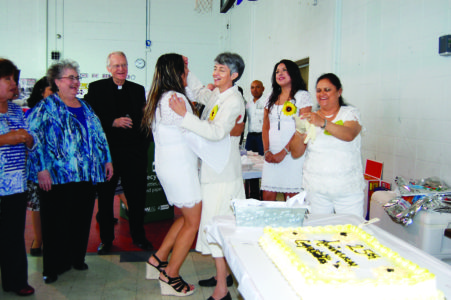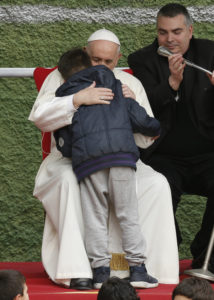
Father Ron Rolheiser
IN EXILE
By Father Ron Rolheiser, OMI
Moral outrage is the antithesis of morality. Yet it’s everywhere present in our world today and is everywhere rationalized on the basis of God and truth.
We live in a world awash in moral outrage. Everywhere individuals and groups are indignant and morally outraged, sometimes violently so, by opposing individuals, groups, ideologies, moral positions, ecclesiologies, interpretations of religion, interpretations of scripture and the like. We see this everywhere, television networks outraged at the news coverage of other networks, church groups bitterly demonizing each other, pro-life and pro-choice groups angrily shouting at each other and politics at its highest levels paralyzed as different sides feel so morally indignant that they are unwilling to contemplate any accommodation whatever with what opposes them.
And always, on both sides, there’s the righteous appeal to morality and divine authority (however explicit or implicit) in way that, in essence, says: I have a right to demonize you and to shut my ears to anything you have to say because you’re wrong and immoral and I, in the name of God and truth, am standing up to you. Moreover, you’re immorality gives me the legitimate right to bracket the essentials of human respect and treat you as a pariah to be eliminated – in the name of God and of truth.
And this this kind of attitude doesn’t just make for the angry divisions, bitter polarizations and the deep distrust we live with today within our society, it’s also what produces terrorists, mass shootings and the ugliest bigotry and racism. It produced Hitler – someone who was able to capitalize so powerfully on moral outrage that he was able to sway millions of people to turn against what was best inside themselves.
But moral outrage, however much it tries to justify itself on some lofty basis, religion, morality, patriotism, historical hurt, or personal injustice, remains always the opposite of genuine morality and genuine religious practice? Why? Because genuine morality and religious practice are always characterized by the opposite of what’s seen in moral outrage. Genuine morality and genuine religious practice are always marked by empathy, understanding, patience, tolerance, forgiveness, respect, charity and graciousness – all of which are glaringly absent in virtually every expression of moral outrage we see today.
In trying to draw us into a genuine morality and religiosity, Jesus says this: Unless your virtue goes deeper than that of the Scribes and the Pharisees you will not enter the Kingdom of Heaven. What was the virtue of the Scribes and Pharisees? On the surface, theirs was a very high virtue. To be a good Scribe or Pharisee meant keeping the Ten Commandments, being faithful to the prescribed religious practices of the time and being a man or woman who was always just and fair in your dealings with others. So what’s lacking in that?
What’s missing is that all of these things (keeping the commandments, faithful religious observance and being fair to others) can be done with a bitter, accusatory, unforgiving heart just as easily (and perhaps even more so) than with a warm, empathic, forgiving heart. Keeping the commandments, going to church and being a just person can all be done (as is only too clear sometimes) out of moral outrage. To paraphrase Jesus: Anyone can be gracious to those who are gracious to you. Anyone can love those who love you. And anyone can be good to those who do good to you … but can you be gracious to those who are bitter towards you? Can you be loving towards those who hate you? And can you forgive those who kill you? That’s the litmus test for Christian morality and religious practice – and nowhere inside of anyone who passes this test will you still find the kind of moral outrage where we believe that God and truth are asking us to demonize those who hate us, do us evil, or try to kill us.
Moreover what we do in moral outrage is deny that we are ourselves morally complicit in the very things we demonize and pour our hatred out on. As we watch the world news each day and see the anger, bitter divisions, violence, injustices, intolerance and wars that characterize our world, a deep, honest, courageous scrutiny should make us aware that we cannot fully separate ourselves from those things. We live in a world of longstanding and present injustice, of ever-widening economic inequality, of endemic racism and sexism, of countless people living as victims of plunder and rape in history, of millions of refugees with no place to go and in a society where various people are branded and ostracized as “losers” and “sickos.” Should we be surprised that our society produces terrorists? However sincere and innocent we might personally feel, how we’re living helps create the ground the breeds mass killers, terrorists, abortionists and playground bullies. We’re not as innocent as we think we are.
Our moral outrage is not an indicator that we are on the side of God and truth. More often than not, it suggests the opposite.
(Oblate Father Ron Rolheiser, theologian, teacher and award-winning author, is President of the Oblate School of Theology in San Antonio, TX.)





